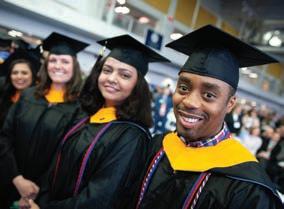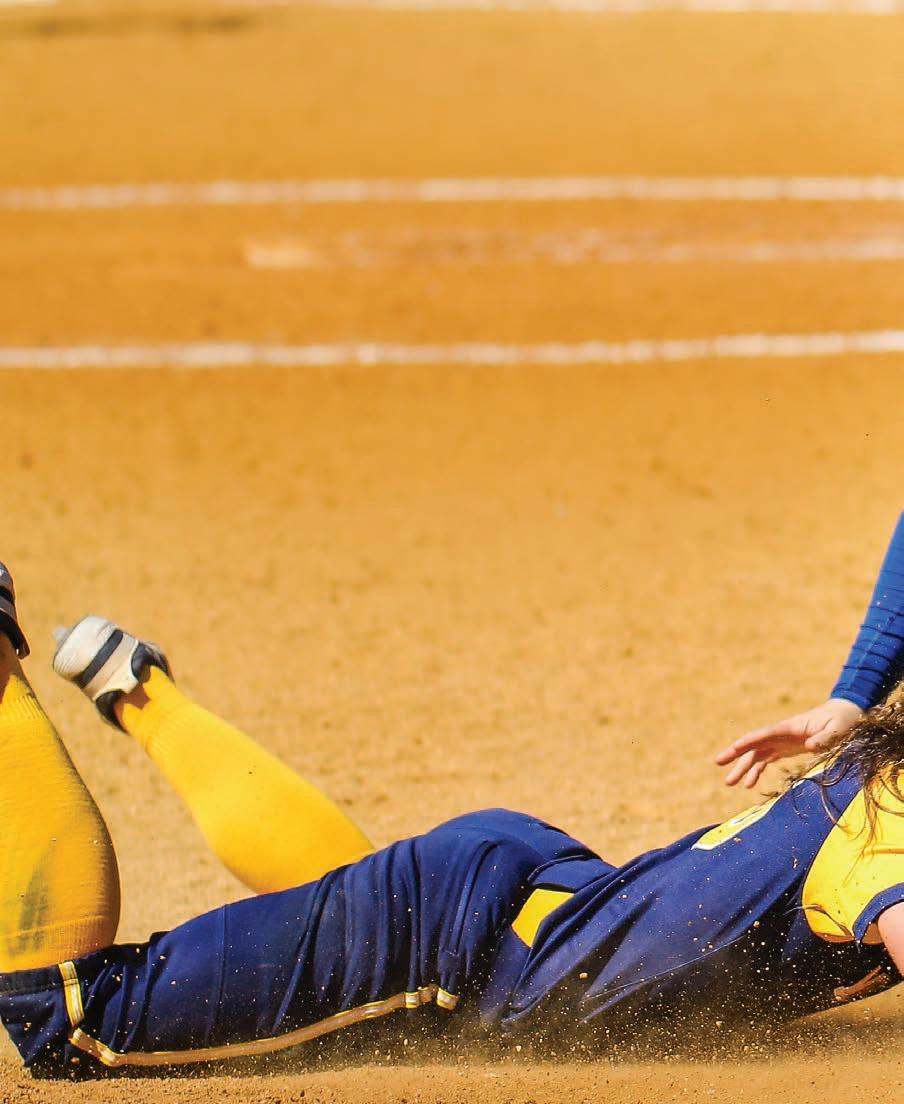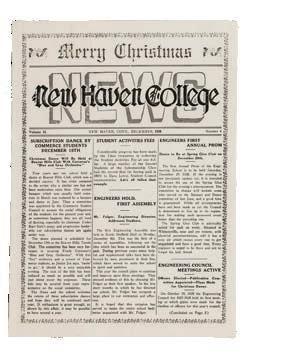
29 minute read
Antique Show
We did some rummaging around in the “attic,” and look what we found: some of the University’s family heirlooms. Are they priceless antiques? To us, they are. They’re a tangible connection with our past, with each piece telling a fascinating story of who or what came before us. They’re stories without an ending, though, because we keep adding new chapters.
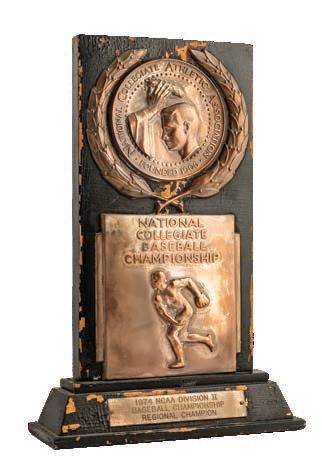
Volunteer Lanyard, 1995 Rebecca Johnson, currently vice president for student affairs, volunteered at the Special Olympics World Games on the University’s main campus.
Contributed by Rebecca Johnson
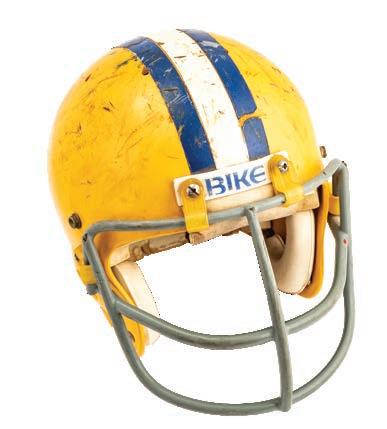
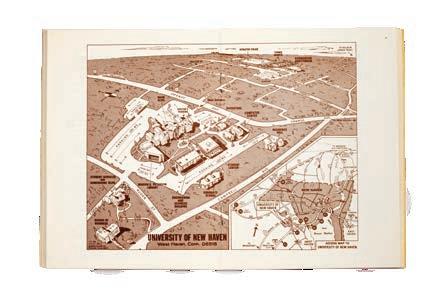
Bartender Award, 1978 This badge was given to a favorite server at the
Rathskeller, the original campus bar.
Contributed by Richard F. Hanley ’78
Baseball Trophy, 1974 The men’s baseball team was recognized as NCAA Division II Regional Champions.
Contributed by University of New Haven Athletics
Newspaper, 1928 New Haven College’s first newspaper was published at holiday time.
Contributed by The Marvin K. Peterson Library Archives
Student Handbook, 1979 An old campus map reveals just how much the
University has grown over the past several decades.
Contributed by Rebecca Johnson
Football Helmet, 1960 This equipment was worn by a proud alumnus during his time as a Charger.
Contributed by University of New Haven Athletics
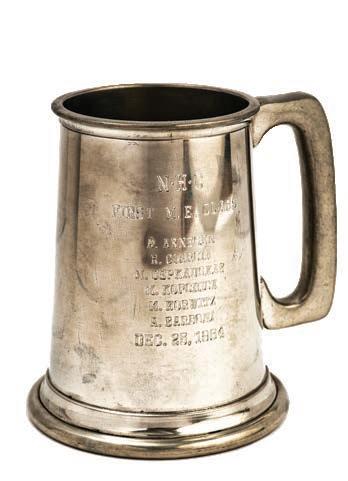
Engraved Mug, 1964 This mug lists the names of the first graduating class from the mechanical engineering program.
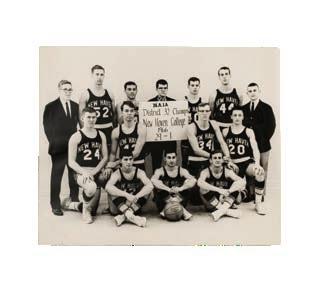
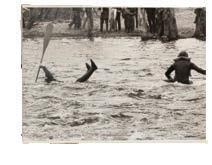
Contributed by The Marvin K. Peterson Library Archives
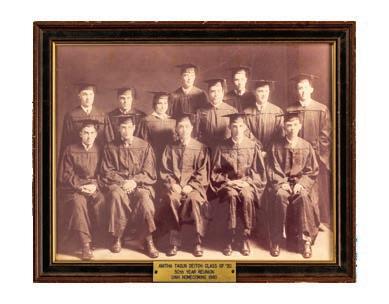
Championship Photo, 1966 New Haven College’s men’s basketball team was recognized as District 32 Champions.
Contributed by The Marvin K. Peterson Library Archives
Concrete Canoe Race, 1975 This photograph shows engineering students battling to design unsinkable canoes from an unlikely building material.
Contributed by The Marvin K. Peterson Library Archives
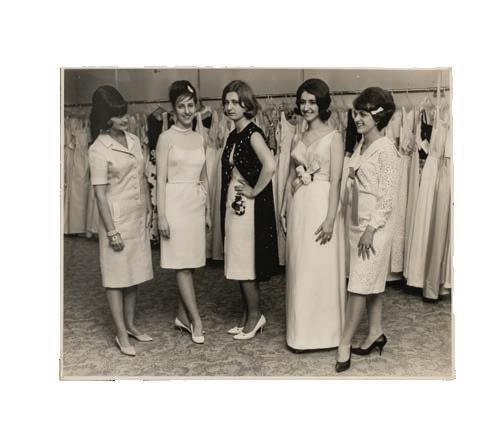
Music Festival Poster, 1976 This advertised a first of its kind festival on North Campus featuring Michael Bolton, then known as Michael Bolotin.
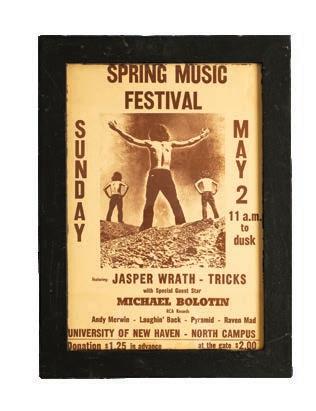
Contributed by The Marvin K. Peterson Library Archives
ANTIQUE SHOW
Award, 1974 A former Charger proudly wore this football varsity letter.
Contributed by Richard F. Hanley ’78
Cowbell, 2002 This was used to showcase school pride in a more recent decade.
Contributed by Paula Cappuccia
50th Reunion, Class of 1930 A photograph of the graduating class was later framed for Homecoming 1980.
Contributed by The Marvin K. Peterson Library Archives
Sorority Sisters, 1970 Members of Chi Kappa Rho dressed in their finest for Homecoming.
Contributed by The Marvin K. Peterson Library Archives
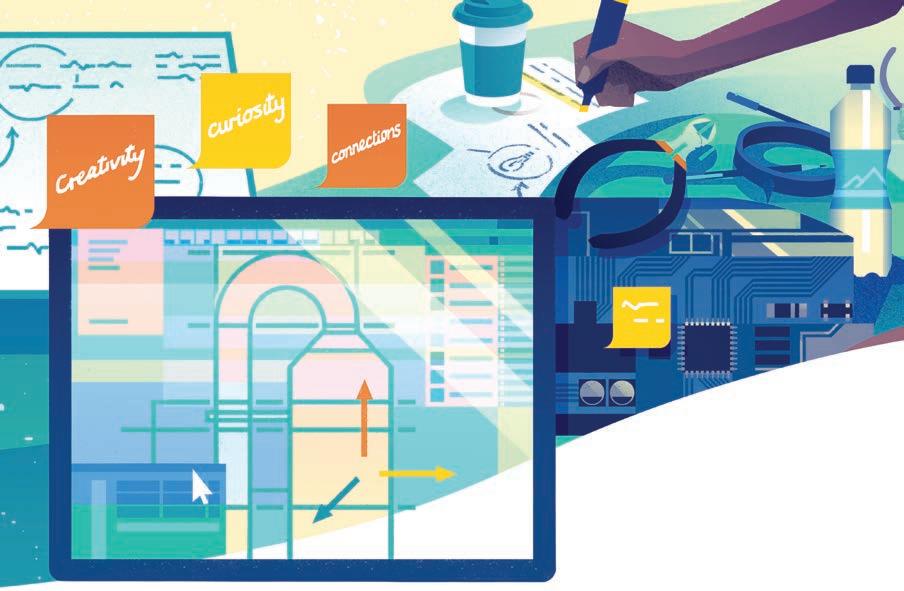
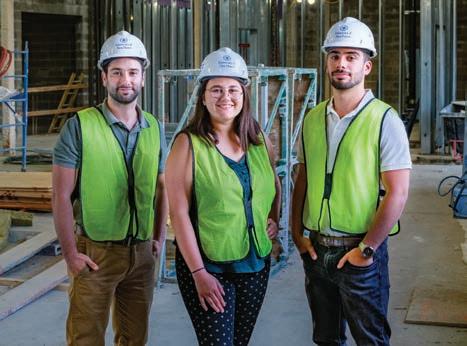
From left: Jonathan Spiegel ’17, Amanda Arango ’19, Daniel Delgado ’17 Not pictured: Jillian Jacques ’19
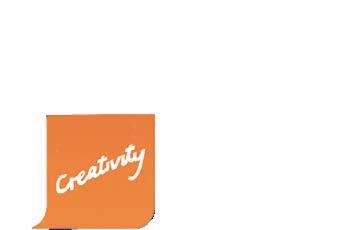
BY JENNIFER KITSES AND ELIZABETH RODGERS ILLUSTRATIONS BY MARK BOARDMAN PHOTOGRAPHY BY DON HAMERMAN
Nothing has to be the way it is now. AGENTS CHANGE
you’re not a fan of the status quo, then you’ve come to the right place. Our rules are simple: if someone tells you something is inconceivable, test the boundaries; if you are frustrated, push forward — you are on to something big; and, if at the end of the day, the space around you is a complete mess, great job! A true tinkerer needs room to strew parts.
Jonathan Spiegel ’17, Daniel Delgado ’17, Jillian Jacques ’19, and Amanda Arango ’19 exemplify these tenants and share a different take on what it means to create something new. It isn’t enough to be a “maker” — you need to have the breadth of expertise to inform your approach, the humility to ask questions and lean on others, and a thoughtful consideration for the resources necessary for tackling whatever problem it is you’re trying to solve; this is exactly why these four change agents were a perfect fit for a relatively new and extremely unique role at the University of New Haven — Innovation Fellow.
The parent program — aptly named the University Innovation Fellows (UIF) Program — is borne out of the Hasso Plattner Institute of Design at Stanford University and was created as part of the National Center for Engineering Pathways to Innovation, a five-year National Science Foundation grant, to provide students with the tools and strategies to make change on their campuses. The UIF motto? “We believe students can change the world.”
Each year, those University of New Haven students accepted into the UIF Program embark on a wild ride. Mentored by Maria-Isabel Carnasciali, Ph.D., associate professor of mechanical engineering and chair of the Department of Engineering and Applied Science Education, fellows travel to the global UIF Silicon Valley Meetup in Palo Alto, collaborate in labs on the Google campus, and receive year-round mentorship from Stanford professors and industry leaders. When they return to the University, they put what they learned into action. In essence, they serve as advocates for lasting institutional change.
The University’s participation has been funded in part by the Kern Entrepreneurial Engineering Network (KEEN). Despite the specificity of its name, KEEN encourages an entrepreneurial mindset in students across all disciplines — one which requires maintaining a curiosity about our changing world, gaining new insights and making connections, and identifying unexpected opportunities to create value. The cover of this issue of the University of New Haven Alumni Magazine pictures the construction site of what will one day be the fully envisioned Bergami Center for Science, Technology, and Innovation — a building that will serve as a vibrant hub for all University students to come together and do just that: test ideas, create new products, pursue new interests, and deepen their emerging passions.
Spiegel, Delgado, Jacques, and Arango are just four of twelve — and counting — “agents of change” to have served as University of New Haven Innovation Fellows, representing four different cohorts, respectively. We hope that you enjoy tagging along on their incredible journeys and look forward to sharing still more innovative tales in the issues to come.
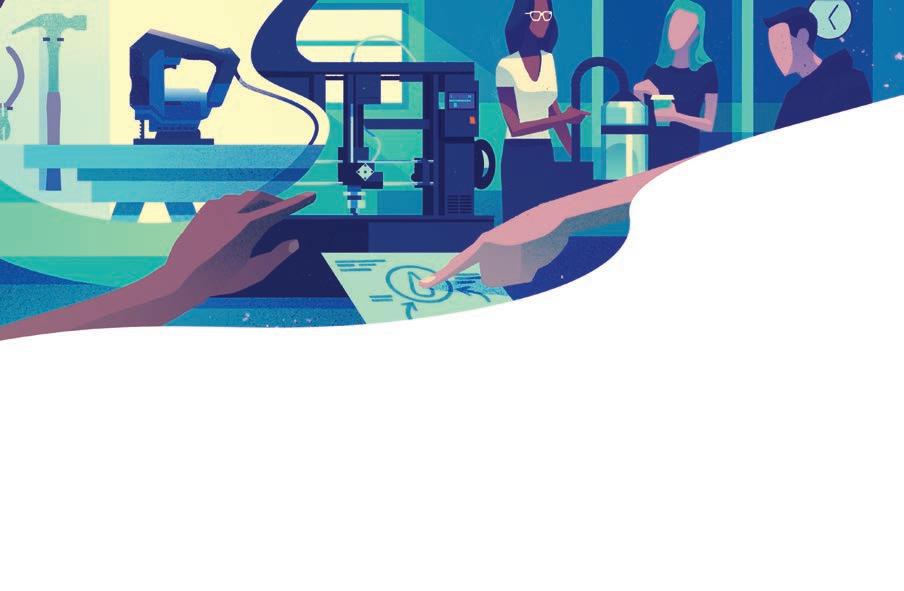
AGENTS CHANGE of
Jonathan Spiegel ’17 is a self-identified troublemaker. What he means by this, he explains, is that he challenges things if he doesn’t understand why they are the way they are.
JONATHAN SPIEGEL ’17

At the University of New Haven, Spiegel was able to embrace this disruptor mentality and dive deeper into his passion for innovation and entrepreneurship. As a sophomore, he had an unprecedented opportunity. At the encouragement of his professors, he applied to and was accepted to participate in Stanford University’s Hasso Plattner Institute of Design’s global initiative — the University Innovation Fellow (UIF) Program — and serve as the University of New Haven’s first Fellow.
At the time, there were only 300 Fellows in the program (there are now just under 2,000 Fellows from 258 global institutions in this prestigious community). Spiegel credits his time at the University and the encouragement and resources afforded by his faculty mentors with his ability to take full advantage of this opportunity.
As a University Innovation Fellow, Spiegel spearheaded the first-ever 3 Day Startup, a statewide program which allowed students from local colleges and universities to come together to develop ideas and turn them into real startup companies. “In order to make that event a reality,” Spiegel says, “I had to pitch it to countless deans and members of the administration in order to show the value that it would bring to the University.”
Getting the event off the ground took almost a year. “There were several weeks that I would work on it during the day, and I wouldn’t be done with my homework until 3 a.m.,” Spiegel says. He raised upwards of $12,000 in donations from alumni; arranged for buses, t-shirts, and food; recruited angel investors to judge innovation competitions; and organized a trip to the Grove, a collaboration space in New Haven. They had a great turnout, with passionate students who created professionallevel presentations to promote their ideas. “It wasn’t high stress, but it was high energy — and exciting,” he says. “Everyone was blown away.”
The event was so successful that it has since evolved into what is now considered to be one of the University’s signature entrepreneurial events, Charger Startup Weekend. Spiegel helped with the transition. “I couldn’t do it forever, and I always wanted it to be sustainable,” he says. In addition, Spiegel also helped promote the University at the first-ever White House Demo Day in Washington, D.C.; pitched the merits of innovation and entrepreneurship to the Board of Governors and to local and state legislators; and, most recently, took part in helping to plan the University’s cornerstone campaign building project, the Bergami Center for Science, Technology, and Innovation.
Since graduation, Spiegel has worked as an applications engineer at RBC Heim Bearings, which develops highly engineered bearings and other kinds of joint solutions for the rapidly growing aerospace, defense, and mining industries. He got a chance to meet the CEO, Dr. Michael Harnett, while he was still a student, after receiving a scholarship in his name, and made sure to introduce himself and share his resume.
Spiegel’s role as an Innovation Fellow and his time at the University were, although later in his life, formative years. “I learned you should not be afraid to stand up and give your input,” Spiegel says. “You can make a difference.” And though he’s now interested in learning how things operate within a corporate setting, he hopes to own his own business one day, stating: “Getting a taste of what it’s like to start up your own company — the hours you put in, the energy — inspired me.”
DANIEL DELGADO ’17
Daniel Delgado ’17 is working at his dream job. As an associate engineer at Metro-North Railroad, Delgado manages multiple projects in an extraordinarily complex transportation system that includes the busiest commuter rail line in the United States: the New Haven Line.
The New Haven Line runs from New Haven, Connecticut, southwest to Grand Central Terminal, and transports 125,000 people a day. It’s the kind of job he dreamed about when he was growing up in New Rochelle, New York, when he first became fascinated by, as he puts it, “all things that move and things that don’t move” — in other words, machines and structures.
It was the Kern Entrepreneurial Engineering Network (KEEN) program, Delgado says, that gave him the skills he needed to get that job. During his sophomore year, Delgado was selected to be the University’s first peer mentor and student coordinator, a KEEN-funded position.
Over the next two years, he worked with University engineering faculty and developed a strategic plan to ensure that the department began to approach curriculum and program development with an innovative mindset — setting priorities, focusing energy and resources, strengthening processes, and making certain that faculty and administration alike were working toward this common goal. One important piece of this was his work to create a small, entrepreneurial community within the University’s larger Engineering Learning Living Community (LLC). The LLC allows firstyear engineering and applied science students to live together in a residence hall, take similar courses, meet with faculty mentors throughout the year, and participate in special group activities both in the residence hall and off campus. Delgado’s initiative, E2LLC, offers a variety of enriching activities, including monthly discussion dinners, industry competitions, engineering challenges, 24-hour “Imagination Quests,” and tours of companies that one day may very well be potential employers for the LLC members. Delgado also mentored and tutored first-year engineering students.
Before working with KEEN, Delgado planned to focus his career pursuits Working on the on his industry major, civil strategic plan engineering. “Working and E2LLC on the strategic plan and really changed E2LLC really changed my perspective,” he says. “It created this bridge my perspective. It created this between engineering and bridge between business that I feel is lack- engineering and ing in technical education.” business that I In engineering school, feel is lacking you’re primarily focused on numbers, he says, but not on financial numbers. in technical education. Civil engineers work with numbers related to structures and foundations, and mechanical engineers with numbers related to designing machines. “In the real world, you also have to consider resources and feasibility and build a sustainable business model.” In addition to his role as a KEEN mentor and coordinator, Delgado succeeded Spiegel and became the University’s second Innovation Fellow, continuing to build on these initiatives and to inspire new ones — activities which only further strengthened his desire to pursue a career that necessitated an integration of entrepreneurship and business.
This speaks to yet another reason why his current job is so perfect for him. “In my role at Metro-North, you have to have the engineering background to understand the problems of the project and the nature of the construction, but you’re responsible for maintaining both the budget and the schedule,” he says. “I’ve learned it never hurts to suggest a new way to conduct business. That, to me, is the essence of innovation: trying to do something that hasn’t been done before.”
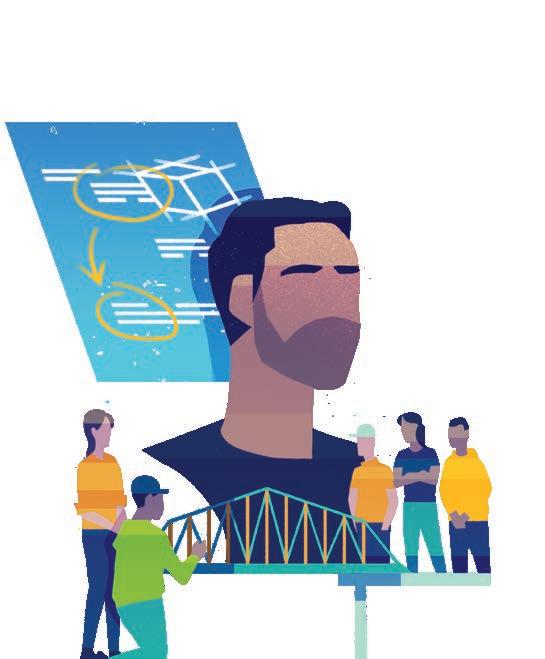
JILLIAN JACQUES ’19
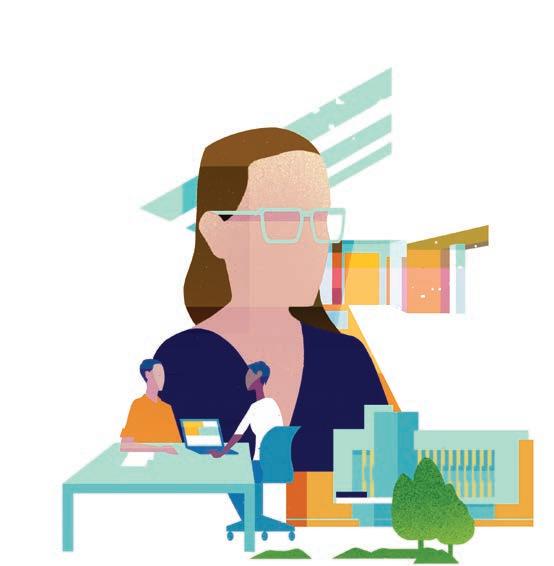
This summer, Jillian Jacques ’19 will be leading a team of software developers at recruiterboom, a startup recruitment agency in Londonderry, New Hampshire, that focuses on “we culture”: empowering all of its employees to explore how their interests and talents can be applied to the business.
The agency describes itself as an “innovation incubation experienced on campus — really pushed me to grow first semester at the University taking courses in Prato, center,” and Jacques doubts she would have pursued as a person,” she says. “I don’t think I’d be as confident Italy, on the University’s Tuscany Campus. Jacques a position there if she hadn’t been a 2017 University as I am now if it hadn’t been for those opportunities and started looking at colleges in her early teens, and one Innovation Fellow. Just a few years ago, as a computer for the professors who pushed me to step outside the of the many reasons she was drawn to the University science major, she found the word innovation somewhat proverbial — yet ever-present — comfort zone and into of New Haven was its willingness to incorporate study intimidating — she’d always thought it meant creating a place where it was safe to experience failure.” abroad in an engineering program. That first semester something entirely new: a product, method, or idea. But Experiencing failure is “absolutely necessary,” she opened her eyes to a wider world and taught her that, going through the UIF Program taught her that innova- says. “I hate the idea of it, but I’ve come to understand with a little luck, “you’ll always run into people who can tion is also about collaboration: sharing and appreciate why it’s important. Failure help you.” Perhaps most important, it set the tone for ideas and working with others to see how can teach you what direction to go in and the rest of her college experience: always expanding their experiences and yours can solve a Failure can what parts of your idea did and didn’t her horizons and setting her sights further than what problem or clarify next steps. teach you what work. It teaches you how to take criticism. is expected. Like Delgado, Jacques found great value in working with KEEN. She credits the program, which showed her how to direction to go in and what If you can fail gracefully, you’ll have a huge leg up in every aspect of life.” It’s also an almost inevitable part Jacques is graduating in December and hopes to go into software development project management. Rather than “always say yes” — the advice often given combine her engineering background with parts of your of taking risks, which Jacques has to striving innovators, entrepreneurs, and creators of business strategies and tools, with helping idea did and been willing to do since the start of her every type — she’d advise future students to “take her learn a critical career skill: how to pitch didn’t work. It undergraduate education. She grew advantage of opportunities, but say yes only as often herself. “All of the innovation programs — KEEN, UIF, and everything else I’ve teaches you how to take criticism. up in the town of York, in south central Pennsylvania, yet chose to spend her as you feel comfortable. Set boundaries, but not to hold yourself back. Set boundaries to keep yourself healthy.”
AMANDA ARANGO ’19
Like many little kids, Amanda Arango ’19 had a lemonade stand, although in her case it was more like a pop-up store, one that she strategically relocated around her neighborhood to maximize the benefits of rush-hour foot traffic.
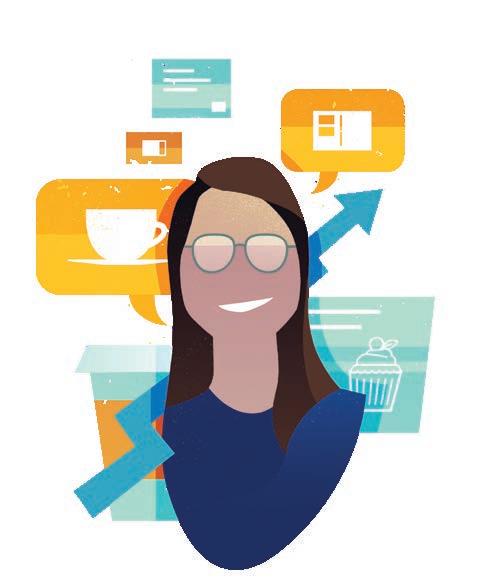
And unlike most kids, she took this entrepreneurial impulse to the next level, launching her first business — a cake-decorating venture called Scrumptious Treats — while she was still in elementary school. Although most of her marketing took place at her nieces’ and nephews’ birthday parties, she created a business card and printed flyers, and by sixth grade was earning upwards of $25 a cake. By high school, she was dreaming of owning a coffee shop, despite the challenges of selling hot beverages in her hometown of Miami.
When Arango started at the University of New Haven as a marketing major, she was firmly attached to the idea of one day starting her own business. Walking around campus her first semester, she saw posters for Startup Weekend, which had taken on even greater momentum since Spiegel helped launch the initiative several years prior. “In just three days, I got to see what my life could be like as an entrepreneur,” she says. “I loved every bit of it.” Her team won that year’s competition — they built a platform, Interview4U, to provide students with online personal coaching and mentorship as well as mock interview prep and additional add-on features — and Arango immediately sought more ways to be involved with entrepreneurship on campus. Brian Marks, the executive director of the University’s Entrepreneurship and
Innovation Program, more confident and Professor Maria- that I can do Isabel Carnasciali, chair that — that I can of the Department create change. of Engineering and Applied Science Education, agreed to sponsor her application to the UIF Program. Attending the intensive meet-up on the Stanford campus left her in awe. She met students from around the world and became close with a group from the Netherlands. “They were all doing these big things on their campuses,” she says. “It was amazing to me, and I wanted to bring those ideas back to school. UIF gave me this global perspective and also showed me I could make a difference in my current capacity, right here in West Haven, as a student.”
When she returned to the University, she devoted her energy to supporting co-curricular entrepreneurship programs, and to encouraging two projects in particular: the creation of a thinking space/ startup incubator where students could brainstorm and work on problem identification, ideation, customer discovery, and prototypes; and establishing a framework for TED-Ed — a version of TED Talks for students and teachers — on campus. Both projects are still in the planning stages, but she’s excited to see how the next wave of entrepreneurial-minded students will carry them forward. “We are all change-makers,” she says.
This fall, Arango is starting a master’s program in entrepreneurship at the University of Florida. She still plans to start her own business one day. “But the school and the UIF Program showed me I want to do more,” she says. “I want to benefit society. I want to have a positive impact on the world. And I feel a lot more confident that I can do that — that I can create change.”
IMAGINATION. INNOVATION. IMPACT. 100 YEARS OF SUCCESS

This is a special time to be a Charger. We are on the precipice of our second century of success because of you, our readers — the alumni, friends, parents, faculty, and staff who believe in the University of New Haven’s mission and support this institution in so many significant ways. In advance of our historic Centennial in 2020, we took the University on the road, hosting a series of signature events to commemorate this milestone anniversary.
These festive gatherings of University alumni and friends were opportunities to look back on our past and to celebrate our future. Nearly 200 guests attended our inaugural celebration in Boston on April 25 at the
Museum of Science. This event was hosted by Herb Chambers HON ’16, president and
CEO of the Herb Chambers Companies. Our next stop was the St. Regis New York where, on
May 18, just under 250 guests came together for a celebration hosted by Board of Governors
Vice Chair Charlie Pompea ’71, EMBA ’90,
HON ’06, and his wife, Tamera Pompea. At the center of each of these celebrations were student-led expositions where students and faculty members in each of the University’s colleges and schools presented research and innovative projects underway at the University, showcasing the truly imaginative and entrepreneurial spirit of our student body. The University of New Haven has come a long way in the past 100 years, and we are committed to continuing this incredible momentum into a future that beckons with possibility and the promise of imagination, innovation, and impact.
#UNEWHAVEN100
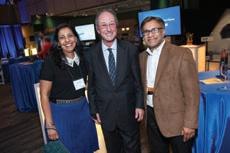

One guest experiences a shocking beginning to this signature event. Dave Galla ’99 takes guests through an interactive timeline of the University’s history.
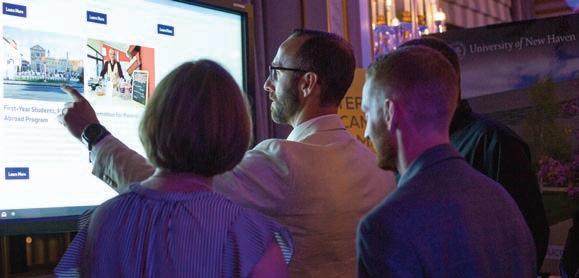
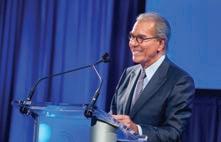
President Kaplan celebrates with Anil Shah ’86 and his wife, Hina.
Herb Chambers HON ’16 hosts guests at the inaugural reception in Boston.
Alumni reconnect with their alma mater. #UNewHaven100

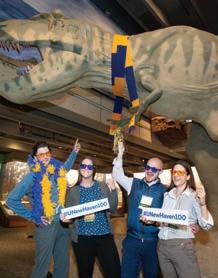
(L-R) William L. Bucknall Jr. ’63, ’65, Philip H. Bartels, and New York event host Charles E. Pompea ’71, EMBA ’90, celebrate at the St. Regis. Matthew Sheehy ’19 lets an attendee test out his backpack propulsion device.
STUDENT SHOWCASES
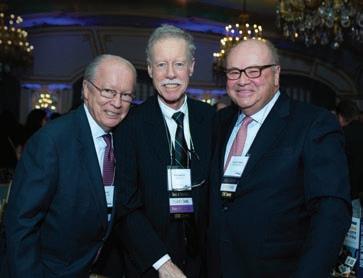
WNHU Podcasts Live interviews with alumni guests for an upcoming series of Centennial podcasts on the University of New Haven’s radio station.
Slate Pages LLC: Linking Information to Assets An app for small business owners to manage assets in real time.
Project 7C: A Government-Sponsored Research Effort An analysis of the largest repository of data related to the conflicts in Syria and Iraq.
Detecting Deception A demonstration on the efficacy of Modified Cognitive Interviewing during interrogation.
Seeing the Future of Health Education Through 3D Virtual Reality An inside look at how state-of-the-art 3D Organon VR software is being used to educate the next generation of healthcare professionals.
Backpack Propulsion A device that can generate more than 70 pounds of thrust and draw up to 33 horsepower, enabling most unpowered modes of transportation, such as bikes, scooters, and skis, to be motorized.
SAVE THE DATE: FLORIDA
Charging Into a City Near You!
Saturday, February 8, 2020 Boca Raton Resort and Club
Hosted by Ernest F. Schaub ’72, University Board of Governors newhaven.edu/100years
ALUMNI SPOTLIGHT
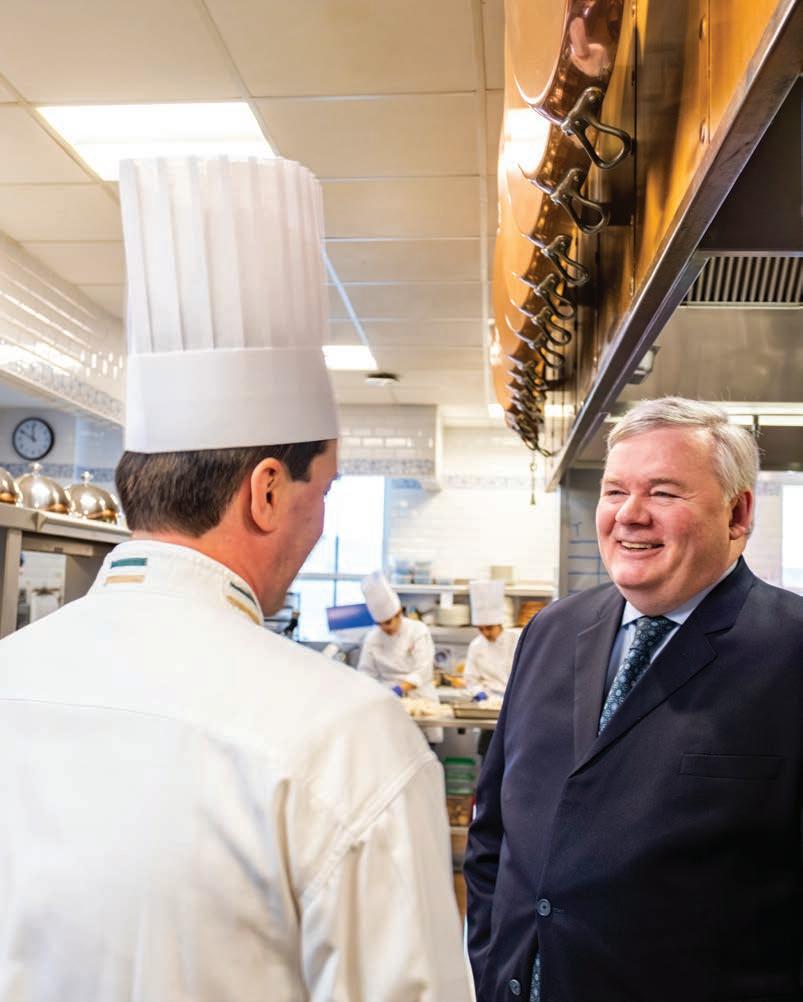
Dr. Ryan talking with Assistant Professor and Chef Jason Potanovich prior to lunch service in The Bocuse Restaurant.

BY JENNIFER KITSES PHOTOGRAPHY BY DON HAMERMAN
Tim Ryan ’94, EMBA ’96, head of the Culinary Institute of America, believes in working hard and eating well.
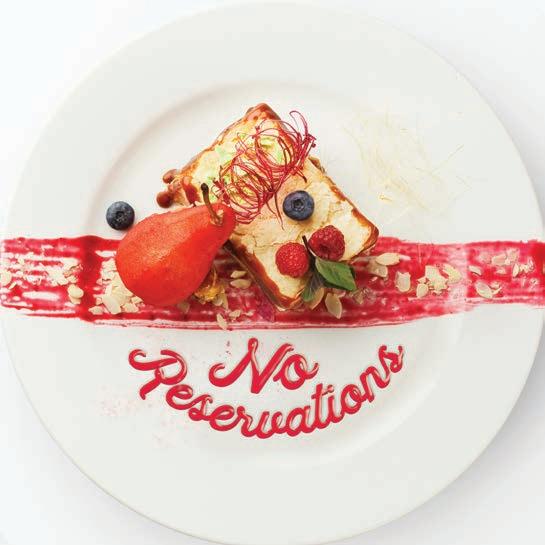
In 1971, when he was 13 years old, Tim Ryan filled in for a friend who worked as a dishwasher at a local Pittsburgh restaurant. At the end of the shift, Ryan was paid $10 in cash and given a steak dinner.
It was a good haul for a day’s work. It was also a day that would change Ryan’s life: he’d stumbled headlong into a vocation … and a dream. “The kitchen was a magical place,” he says, “the flames and knives and the ballet performed behind the line by the chefs and the wait staff.” The chef asked Ryan to come back, and soon he was working as much as he could, eager to spend time in the kitchen. In many ways, he never left.
Ryan has spent the past 37 years at the Culinary Institute of America and has served as its president since 2001. During his tenure, the Institute launched its famed American Bounty Restaurant and expanded educationally and geographically, offering new academic programs and degrees, including the world’s first bachelor’s degrees in management of culinary arts and in baking and pastry arts and opening campuses in Napa County, San Antonio, and Singapore. Ryan himself has received abundant recognition: at the notably young age of 26, he was named a Certified Master Chef, and at 36 he became the youngest national president of the American Culinary Federation. He led the ACF Culinary Team USA to victories at the Culinary Olympics and the first Culinary World Cup, and he is one of only five Americans to receive the Presidential Medal from the World Association of Chefs’ Societies. Most recently, he was named by Pittsburgh Magazine as one of the “50 Greatest Pittsburghers of All Time” — a list that includes Jonas Salk, Andrew Carnegie, and Martha Graham.
Back in the early ’70s, Ryan couldn’t have dreamed that he’d one day reach these heights. His first step? Asking the chef of that Pittsburgh restaurant to teach him how to cook. The chef tried to talk him out of it, telling Ryan that he was a smart kid and should become a lawyer. “But I didn’t know any lawyers,” Ryan says. “We were a poor family. Here was a real person, who was dynamic and very successful, working in this cool environment.” Ryan insisted his future was working with food.
Some people might scoff at that career choice. But, as Ryan points out, the food industry is the largest in the world. “Most people don’t know that,” he says. “That’s why I always give them a statistic based on our research: 100 percent of the world eats food.” Jokes aside, Ryan is an evangelist for the food world and restaurant industry, and the opportunities they offer to young people — opportunities that weren’t so clear when he was starting out. »

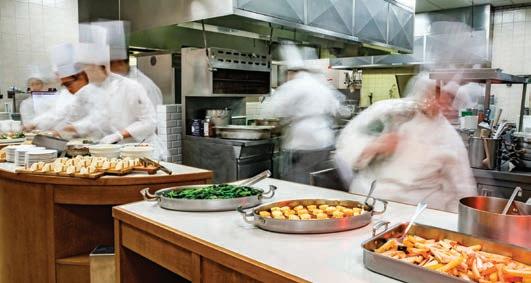
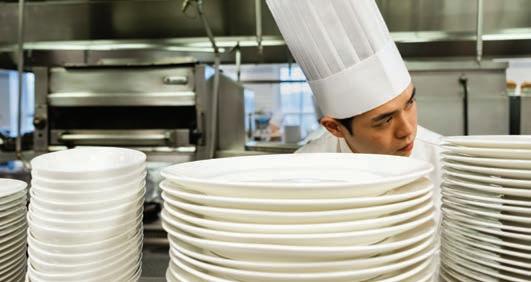


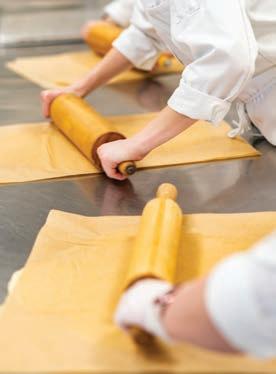
the young american
Ryan has overseen a multitude of changes at the Culinary Institute of America. He first came to the school as a student, and, as did every other aspiring chef at the time, wanted to study French cuisine. After graduating in 1977, Ryan traveled to Lyon, France, to study in the kitchen of Paul Bocuse, a famous chef associated with nouvelle cuisine, a lighter and more modern approach to French food. Upon his return, hoping that he would become the American version of Bocuse, Ryan opened a French restaurant in his hometown.
A few years later, Ryan met Ferdinand Metz, then president of the Culinary Institute of America. Metz wanted a young American chef to develop a new concept: a restaurant that would treat American cuisine with the reverence usually reserved for the French. In 1982, at the age of 24, Ryan returned to the College as a faculty member, determined to set that idea in motion.
There was just one problem: the food. “My generation of graduates led an American food revolution when we said, ‘The chickens here don’t taste like chicken.’ ” Like many chefs who’d studied in France, Ryan came back with a new awareness of what American supermarkets lacked. “If you walk down your supermarket aisle today, you’ll see the changes we brought about,” Ryan says. “When I was a kid, there were heads of iceberg lettuce, onions and carrots and celery. If there were mushrooms, they were white button mushrooms. Chili peppers, forget about it.”
The other part of that revolution was using fresh, authentic ingredients to cook American cuisine — a crazy notion in the early ’80s, when most people thought there was no such thing. The American Bounty Restaurant was one of the first to challenge that idea, with a menu that indicated the origin and inspiration of many of its dishes, which included Cajun shrimp-stuffed mirliton squash; ham roulades Maryland style, stuffed with crabmeat and corn; and cioppino, a fish stew from San Francisco. Today it focuses on the seasonal and regional specialties of its Hudson Valley home.
a greater impact
By joining the Culinary Institute of America, Ryan had stepped off his path of becoming the American Paul Bocuse. But at the school, he’d discovered a new version of his original dream. “I was a student here and loved it, but it’s completely different being a faculty member,” he says. “You’re impacting young people’s lives in a much more powerful way.” One day, Ryan told Metz that he hoped to eventually serve as president of the school — an audacious thing for someone in his 20s to say to the then-president, Ryan admits. Metz helped Ryan brainstorm 20 tasks he needed to complete if he hoped to achieve that goal, including earning a doctoral degree (Ryan had an associate’s degree from the college at the time), becoming a Certified Master Chef, and moving into the school’s administration. Metz also gave him a critical piece of advice: There are no guarantees.
This did not dissuade Ryan. He enrolled at the University of New Haven to further his education. Ryan was living in Hyde Park and working full time, and he drove two hours to West Haven several times a week to take classes at night. After earning his bachelor’s, Ryan entered the University’s Executive MBA program. “In my
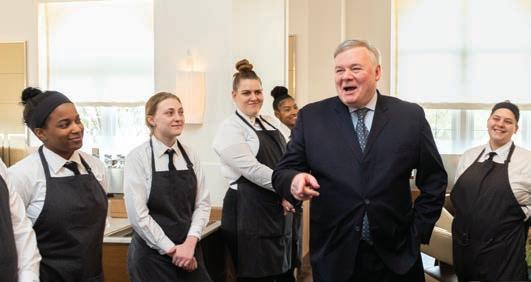


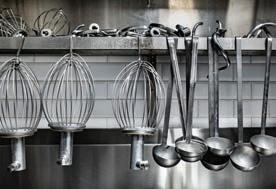
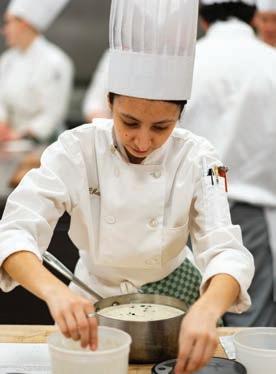
cohort there were people who were experts in logistics and finance and marketing and so on,” he says. “It was a great experience, because you learned not just from the faculty and your own studies, but from your classmates.”
By this time, Ryan had joined the Culinary Institute of America’s administration, focusing on increasing appreciation of cuisines from around the world. Two decades ago, the college held its first annual Worlds of Flavor conference, which this year will introduce attendees to — among many other offerings — the tandoor ovens of South Asia, the amphora-aged wines of Georgia, and the markets of Istanbul, Persia, and the Indian state of Kerala. Two years later, Ryan achieved his dream of becoming the school’s president.
Ryan’s tenure has also included outreach projects focused on public health and environmental sustainability. In 2004, the school launched Healthy Kitchens, Healthy Lives — a partnership with the Harvard T.H. Chan School of Public Health which features an annual leadership conference for health professionals who want to learn more about nutrition. Another partnership with the Harvard School of Public Health is Menus of Change, an initiative fueled by both social responsibility and an awareness of opportunity. The research on what people should and shouldn’t eat is clear, Ryan says. “People choose French fries over carrot sticks because they taste better,” he explains. “Our challenge is: how do we make the healthy things as enticing and delicious as French fries? As we learn how to do that, we’ll sell more carrot sticks, and the industry will make money. It will be better for people and better for the environment.”
at the end of the day
Other than his family, Ryan’s greatest source of pride is his career. “This has been my life’s work,” he says. Chefs, he argues, are entrepreneurs, inventors, and artists. “What medium allows for greater creativity than food? It encompasses all the senses. It is the ultimate artistic expression and lends itself to endless innovation.” Yet he feels the restaurant industry is often misunderstood. “People say we work so hard, and kitchens are hot, and there are low-paying positions,” he says. “I would argue that if you want be successful in any profession, you’re going to have to work hard. I don’t know that any restaurant is that different from an accounting firm or a law firm or a tech firm. I’m willing to bet that folks at Google work pretty hard.”
Ryan’s trajectory has been described as rising from the dishwashing room to the boardroom. Yet he argues that his path is not that unusual and that he, like so many others, was drawn to the kitchen not just for the financial opportunities, but for two rewards that should not be overlooked: the chance to make something tangible and the opportunity to participate in an experience whose end goal is happiness. Restaurants are about taking care of people and helping them enjoy themselves and celebrate, he says. “We come in, we have a bunch of raw product,” Ryan says. “We do the preparation, we cook it, we serve it, and by the end of the day, we have a sense of accomplishment. We say, ‘We had a great day. Look at what we did. We made all these people happy.’”


